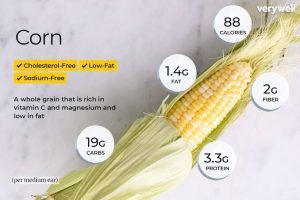The popular vegetable offers many beneficial nutrients, and to reap the most health benefits of corn, experts recommend eating it in its least processed form such as fresh corn on the cob (roasted, grilled, or boiled), or frozen corn (frozen at peak freshness and steamed until done). ), both of which are great ways to enjoy their grains
Health benefits of corn
1 – Corn contains soluble fiber for feeling full and gut health.
A medium-sized bag of corn contains about 2 grams of fibre. Corn contains soluble (versus insoluble) fiber, helps you feel full and satisfied, and promotes healthy gut bacteria. While corn is a starchy vegetable, meaning it is naturally higher in carbohydrates than some other vegetables, soluble fiber helps slow the absorption of carbohydrates, preventing spikes in blood sugar and keeping you from feeling hungry again quickly. .
2 – A source of vegetable protein.
Corn offers more protein than most other vegetables. Like fiber, protein helps keep hunger and food cravings at bay and performs many essential functions in the body, including muscle repair and growth.
3 – Corn contains nutrients that protect vision.
Lutein and zeaxanthin give common types of maize their yellow color and are the main pigments found in the macular of the human retina. Consuming these two carotenoids can help protect the eyes from blue light damage, improve visual acuity, and even reduce the risk of age-related macular degeneration and cataracts.
4 – Corn provides potassium and magnesium.
One serving of corn contains about six percent of the daily potassium needs and nine to 12 percent of the daily magnesium needs. These minerals (classified as electrolytes) play a role in many different body processes. Potassium, to name a few, helps regulate hydration levels, send nerve signals, protect bones, and reduce blood pressure. Magnesium is also involved in nerve function and regulation, blood pressure management, and reduced risk of stroke and ischemic heart disease.
5 – Corn contains vitamins C and vitamin B.
One cup of sweet yellow corn contains 17% of the daily value for vitamin C, an antioxidant that supports the immune system, collagen production, and iron absorption.
It also provides about 24% of the DV for thiamin and 19% of the DV for folate – both B vitamins that help convert carbohydrates into energy. Folic acid is especially important to consume during pregnancy to ensure the normal development of the fetus and prevent certain birth defects. It is recommended that adults consume 400 mcg of folic acid and 600 mcg daily during pregnancy. One cup of cooked corn provides about 51 mcg

